Snoring & Sleep Apnea
Snoring and Sleep Apnea
Are you suffering from a sleep disorder such as snoring or sleep apnea? Or are your sleep and lifestyle affected by someone else who has these problems? Believe it or not, sleep disorders are much more than something to joke about. They can actually be quite hazardous to your health. Not only may they be to blame for feeling poorly rested, but they can also be the cause of heart attacks, high blood pressure, low energy, poor sexual function, and even your last fender-bender, among other things. They can wreak havoc on your health, and can even be life-threatening for you and others. Dr. Victor may be able to help. At Springfield Smiles TMJ and Sleep Center, Dr. Victor is committed to diagnosing and, when possible, treating sleep disorders. Whether you’re plagued with sleep apnea or another type of sleep disorder, Dr. Victor has the tools to evaluate your condition and recommend solutions based on your needs.
If you are looking for relief from your snoring (or your partner’s), we can help. Call 937-390-3077 or email today to set up a consultation with Dr. Victor.
What Causes Snoring
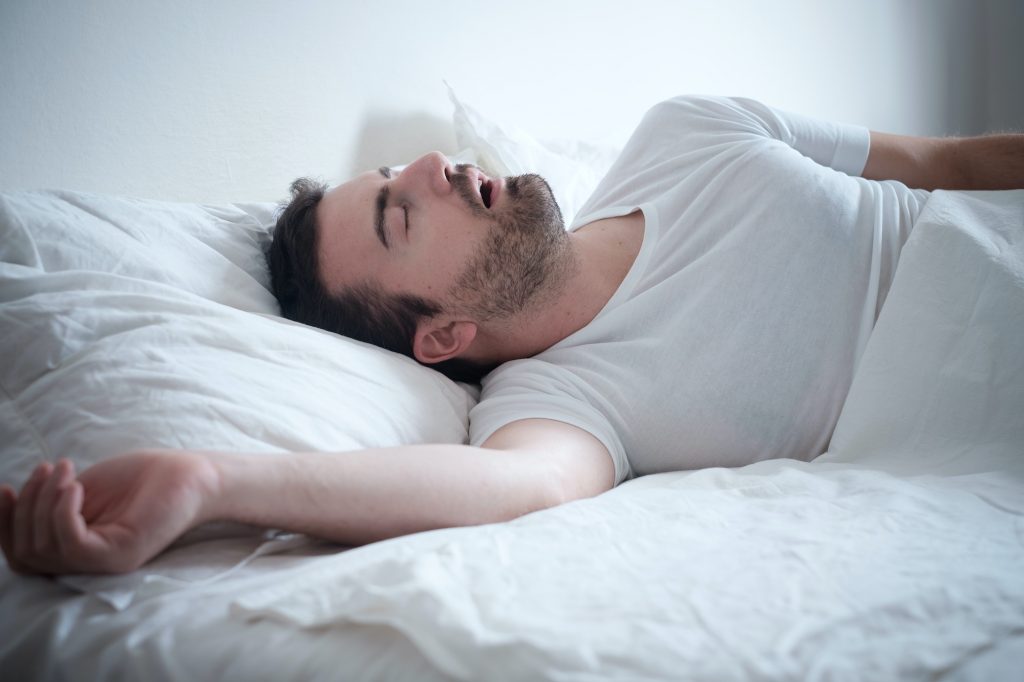
Snoring is caused by an obstruction to your breathing. When you’re awake and upright, your muscles and gravity work together to hold your airway open. But when you lie down and your muscles relax during sleep, gravity pulls your airway closed, allowing your airway to contract. If your airway narrows, air cannot flow smoothly through it, which causes turbulence that vibrates the throat. These vibrations are the sounds you hear.
Dangers of Snoring
People often think that snoring is a minor nuisance, but the truth is that snoring is associated with serious health risks, including:
- Sleep apnea
- Cardiovascular risks
- Car accidents
- Domestic violence
The association of snoring with sleep apnea is a serious risk for many potential health problems, but snoring itself is also a potential risk. It’s associated with cardiovascular dangers, including the potential of a heart attack or stroke. Snoring is an indicator that your body isn’t getting enough air when you sleep, and means you are not getting good sleep. Snorers have an increased risk of falling asleep behind the wheel, and may be at risk for serious workplace accidents.
To people outside the home, it’s easy to look at snoring as a joke, but if you are constantly living with a snorer, you experience the very real torture of sleep deprivation. Because both members of a couple are not getting adequate rest, they can become irrational, and conflicts over snoring and other issues have unfortunately even escalated to violence.
If you are looking for relief from your snoring (or your partner’s), we can help. Call 937-390-3077 or email today to set up a consultation with Dr. Victor.
Children, Snoring, and Airway
In children, snoring is a serious health risk factor and a key indicator for poor airway function. It and can lead to many significant issues, including:
- Inadequate sleep
- Lack of growth hormone release
- ADHD symptoms
- Poor performance in school
- Irritability
- Poor socialization
- Underdeveloped of jaw structure and sinuses
- Crowded teeth
- Sunken facial features
Even children that do not snore can have poor airway function and should be evaluated and treated as early as possible. A simple test you can perform at home is to ask your child to sit upright and breathe through their nose for two minutes. If they cannot complete this simple test, call Dr. Victor at 937-390-3077 for an evaluation and discussion of treatment options. Often, addressing things as simple as tonsils, adenoids, and orthodontic intervention to properly develop the skeletal system and sinuses can significantly improve a child’s airway for a lifetime.
Obstructive Sleep Apnea
Obstructive sleep apnea (OSA) is an indication that you stop breathing numerous times a night. It occurs when there is an obstruction blocking your airway. These blockages are essentially the same thing that causes snoring, but the blockage is so severe that you literally stop breathing. Ever hold your breath underwater until you could hold it no longer? Now imagine trying to hold your breath for at least 10 seconds longer. That’s what sleep apnea is like. The obstruction occurs after you have exhaled and stops you from inhaling your next breath. Try exhaling, then don’t inhale for 10 seconds, and see what it’s like! Your body doesn’t know how to respond, so it sends your heart racing, your blood pressure skyrocketing, and your cortisol levels shooting up until hopefully you arouse enough to take your next breath, which helps explain the many dangers associated with sleep apnea.
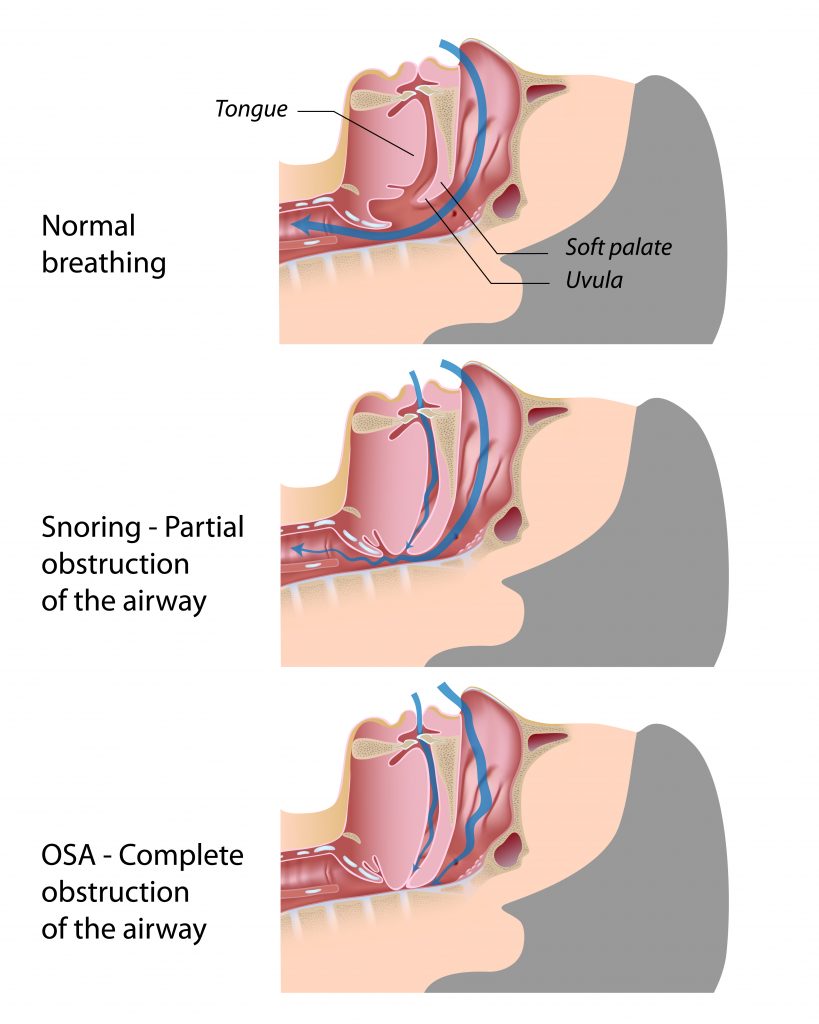
Dangers of Sleep Apnea
Studies link sleep apnea with many serious health conditions, including:
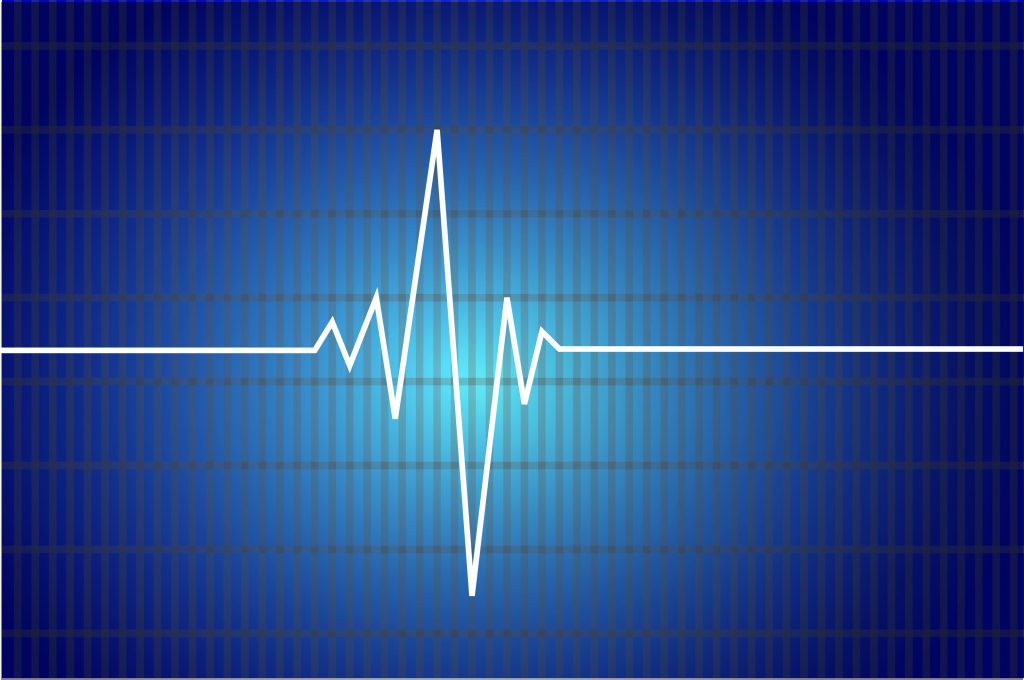
- Doubling your risk for heart attacks
- Arrhythmia
- High blood pressure
- Stroke
- Diabetes (including gestational diabetes)
- Preeclampsia
- Obesity
- Insomnia
- Depression and other mood disorders
- Headaches
- Loss of short-term memory
- Sexual dysfunction
When your brain senses that your oxygen supply is low, it tells your heart to work faster and harder. This leads to uncontrolled high blood pressure spikes at night, and can eventually interfere with your body’s ability to regulate the sympathetic nervous system, triggering elevated blood pressure throughout the day. High blood pressure has been shown to dislodge plaque in the arteries, which can lead to strokes.
At night, your body performs essential tasks for regulating your energy consumption and storage. Sleep apnea interferes with those processes, causing your body to store more fat. This contributes to obesity, and can make your body immune to insulin, causing type 2 and gestational diabetes.
The loss of sleep, whether you’re aware of waking up or not, significantly impairs your brain’s ability to function properly. It can even affect your waking hours by causing fatigue, which has been linked to a host of physical and psychological ailments and can greatly increase your risk of accidents while driving or operating machinery. You may become prone to depression and other mood disorders. You may lose short-term memory and may lose interest in sex or other things you might previously have enjoyed.
Diagnosing Sleep Apnea
There are many common symptoms that can be related to sleep apnea, such as:
- Waking up unrested
- Waking up startled or gasping for breath
- Uncontrolled blood pressure
- Weight gain
- Fatigue or sleepiness during the day
- Dozing off when driving or during other normal daytime functions
- Irritability
- Dry mouth
- Sore throat
- Headaches in the morning
- Decreased sex drive
- Snoring
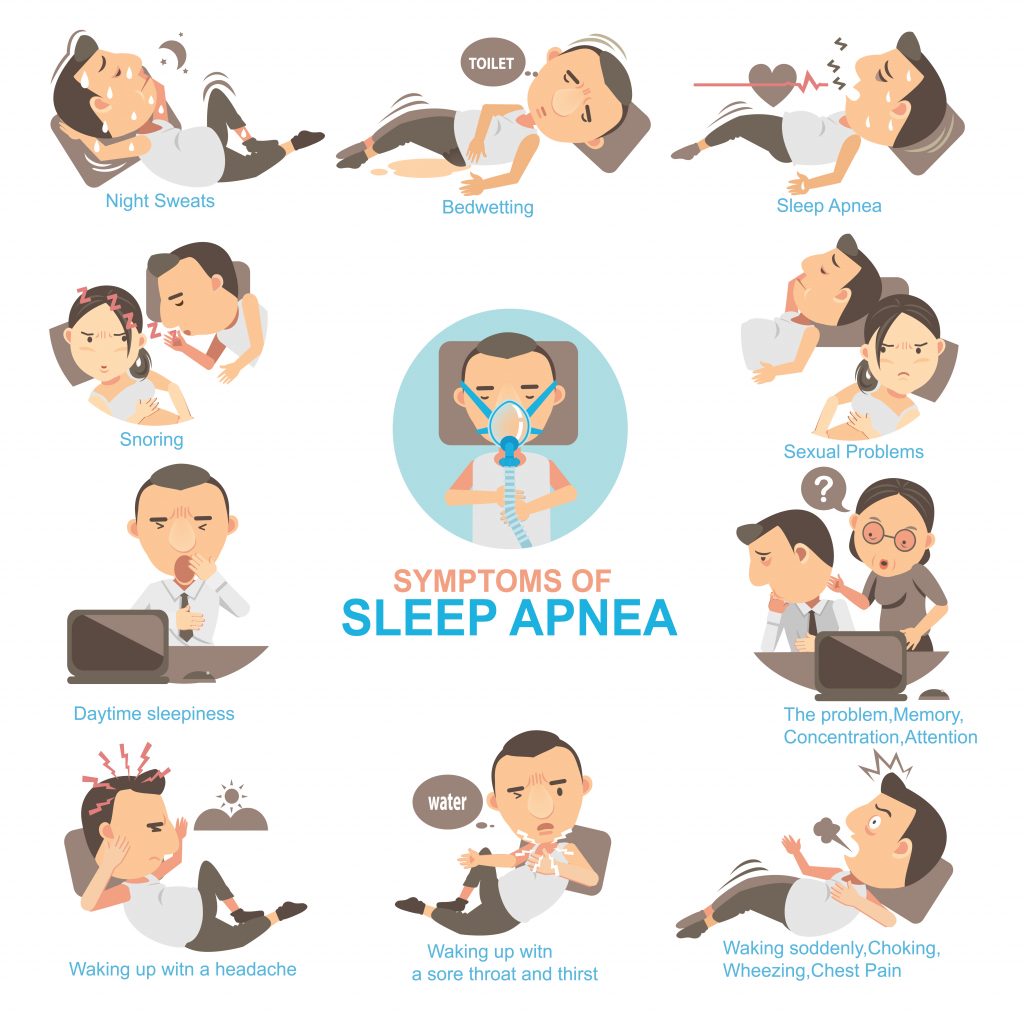
If you notice these symptoms, you should speak to Dr. Victor, your general doctor, or a sleep doctor about your sleep apnea risk. It can only be diagnosed with a sleep test. For many people, this is a simple take-home device that you wear while sleeping in your own bed. We offer in-home testing through SleepTest.com for sleep apnea. It’s comfortable, convenient, and easy to use.
In other cases, diagnosis requires a sleep study in a sleep lab, where you are hooked up to a complex device that measures many aspects of your sleep and can tell whether your breathing is stopping during sleep.
If you are concerned that you or someone you know may be suffering from sleep apnea, take the first step and contact Springfield Smiles TMJ & Sleep Center at 937-215-3615 for an appointment with Dr. Victor.
Treating Sleep Apnea
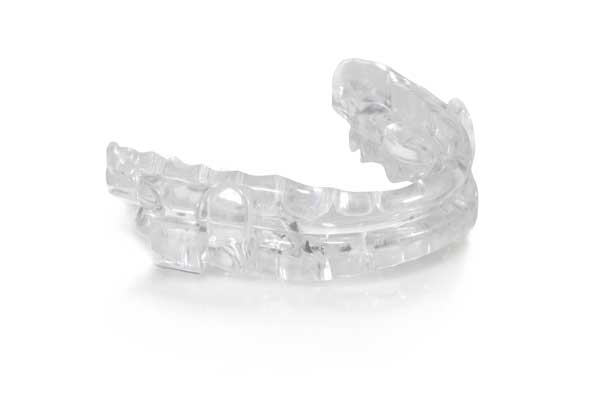 Another option for treating sleep apnea is oral appliance therapy. In mild and moderate cases of sleep apnea, oral appliances have been shown to be as effective as CPAP devices. In severe cases, they significantly improve airway function if a patient is non-compliant or not wearing their CPAP every night. The most common type of oral appliance is a mandibular advancement splint (MAS). The MAS holds your jaw forward while you sleep, which serves to hold your airway open as well. While many sleep appliance options exist that can help remedy this, our team will implement neuromuscular dental techniques to ensure that the appliance doesn’t cause ancillary issues like those associated with TMJ. We offer the very comfortable MicrO2 appliance. Its small size makes it a great solution for people having trouble with bulkier appliances.
In general, oral appliances are recommended for people with mild or moderate sleep apnea, but people with a severe level can benefit if they are unable to tolerate CPAP.
Surgery is not generally recommended, although some people can benefit and it can also work well in conjunction with other types of treatment.
Another option for treating sleep apnea is oral appliance therapy. In mild and moderate cases of sleep apnea, oral appliances have been shown to be as effective as CPAP devices. In severe cases, they significantly improve airway function if a patient is non-compliant or not wearing their CPAP every night. The most common type of oral appliance is a mandibular advancement splint (MAS). The MAS holds your jaw forward while you sleep, which serves to hold your airway open as well. While many sleep appliance options exist that can help remedy this, our team will implement neuromuscular dental techniques to ensure that the appliance doesn’t cause ancillary issues like those associated with TMJ. We offer the very comfortable MicrO2 appliance. Its small size makes it a great solution for people having trouble with bulkier appliances.
In general, oral appliances are recommended for people with mild or moderate sleep apnea, but people with a severe level can benefit if they are unable to tolerate CPAP.
Surgery is not generally recommended, although some people can benefit and it can also work well in conjunction with other types of treatment.
